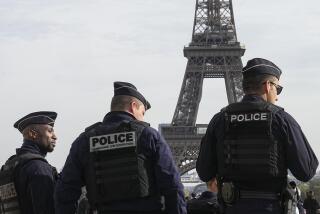11 dead as 2 car bombings rock Algeria
- Share via
CAIRO — Two car bombs struck Wednesday near a hotel and a military compound in Algeria, killing at least 11 people and wounding 31 others, the Algerian Interior Ministry said. The blasts came a day after a deadly attack on prospective recruits at a police academy.
The car bombs detonated about 15 minutes apart at about 6 a.m. in the town of Bouira. The first blast injured four soldiers outside a regional military command center, according to the Algerian press agency. The second killed at least 11 people around the Sophie Hotel, which is reportedly used by employees of a Canadian construction company building a dam in eastern Algeria.
The press agency said that most of those killed were on a bus passing the hotel on its way to the dam site. The agency did not give the nationalities of the victims.
The bloodshed followed the bombing Tuesday that left at least 43 dead, most of them young men waiting to sign up for police entrance exams. A string of assaults over the last 18 months has conjured an eerie echo from the nation’s civil war of a decade ago.
No group claimed responsibility for Wednesday’s explosions, but officials suspected they were orchestrated by an emboldened Al Qaeda in the Islamic Maghreb.
The group has startled the country by changing the dynamics of resistance with an increasing reliance on suicide attacks on international targets and Algerian military and police compounds. The members of the Al Qaeda-linked organization are holdovers from Islamic militias that battled the government from 1992 until 2002, when reconciliation and amnesty programs helped end a civil war in which an estimated 200,000 people died.
“There is no comparison between the civil war and now,” said Mahmoud Belhimeur, deputy editor of El Khabar daily, in a telephone interview. “This is just a small group with no political reason to justify what they are doing. We cannot reconcile with them. The government needs to be firm and to reorganize its military and intelligence agencies.
“The terrorists have changed the strategy,” Belhimeur added. “They’re using tactics from Iraq and Afghanistan. They’re using the Internet for recruiting and cellphones to explode bombs.”
A journalist who asked not to be named said Algerians were frustrated at the government’s inability to stop the attacks across this oil- and gas- producing nation. The most recent violence occurred east of Algiers, in the Kabylie region where security forces have been battling militants.
“People don’t understand,” said the journalist. “They’re told by the government that a military crackdown is underway, yet they can’t believe what they’re seeing. They say reconciliation attempts have done nothing. They’re scared that the war of the 1990s will come back.”
Government raids and amnesty programs had appeared to have weakened Islamic radicals. But beginning in 2007, attacks across the country, including an attempt to kill President Abdelaziz Bouteflika that left more than 20 people dead, indicated that Al Qaeda in the Islamic Maghreb was gaining momentum.
The militants don’t need “a big army now,” said Belhimeur. “Even if this group is only 100- or 200-strong, they can cause great damage and fear with five or 10 suicide bombers. We have to ask why in 2008 some of our young people are going into these radical groups.”
Interior Minister Yazid Zerhouni said after Tuesday’s blast at the police academy: “These terrorist gangs are seeking through attacks against civilians to loosen the net closing around them as security forces drive them to the wall.”
The bloodshed has perplexed a nation that doesn’t want to slide back into the violence of the 1990s. Mustafa Bouchachi, a human rights lawyer in Algiers, said along with crackdowns on militant cells, the government should push harder for economic development, freedom of expression and the improvement of social conditions for a growing population of frustrated youths.
“But the whole civil society and politicians in all cities are condemning these acts, which we think have links to international terrorists,” he said. He added that the militants are different from those the country witnessed during the political turmoil that led to civil war.
“These small groups have nothing to do with Algerian politics,” he said.
--
More to Read
Sign up for Essential California
The most important California stories and recommendations in your inbox every morning.
You may occasionally receive promotional content from the Los Angeles Times.











